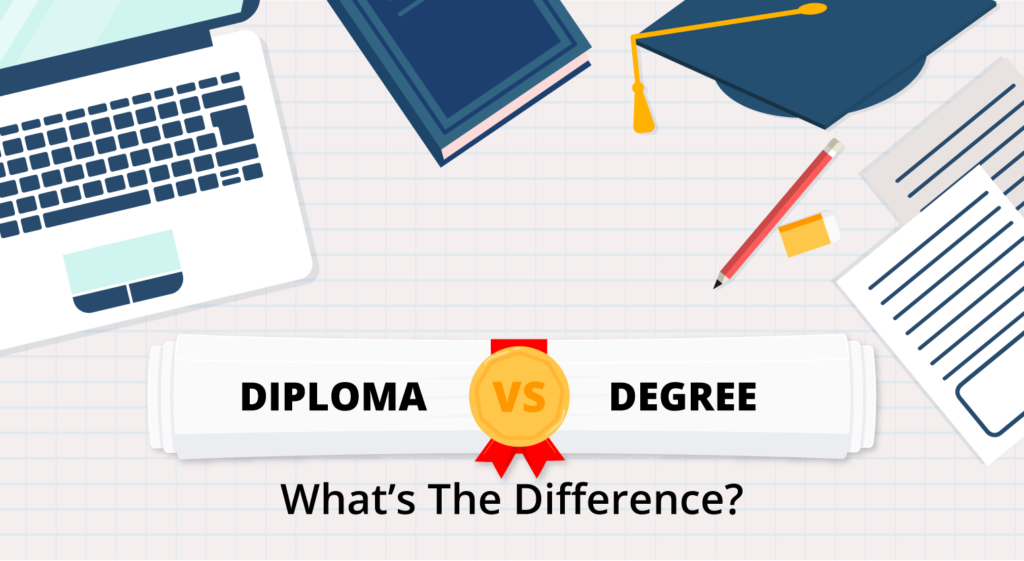Understanding the Distinction Between Diploma and Degree
In the realm of education, the terms “diploma” and “degree” are often used, but they represent distinct pathways with varying implications. Understanding the differences between these two educational credentials is crucial for making informed decisions about your academic journey.

Diploma: A Practical Approach to Skill Acquisition
A diploma is a certificate awarded upon completion of a specialized program. These programs are typically shorter in duration compared to traditional degree programs, often lasting anywhere from a few months to two years. Diplomas are renowned for their practical focus, equipping students with hands-on skills tailored to specific industries. They are an excellent option for individuals seeking rapid entry into the workforce or a career change.
Diploma programs are structured to provide a comprehensive understanding of a particular field, allowing students to quickly acquire the necessary expertise. These programs are commonly offered in vocational or technical schools and community colleges. They cover a diverse range of fields, such as culinary arts, automotive technology, medical assisting, and graphic design.
Degree: A Holistic Educational Pursuit
On the other hand, a degree represents a broader and more comprehensive educational experience. Degrees are typically offered by universities and colleges and require a more extended period of study, often spanning three to four years for a bachelor’s degree. Degrees encompass a well-rounded curriculum that includes general education courses alongside major-specific subjects.
Degrees hold a strong emphasis on theoretical knowledge, critical thinking, and research. They are often seen as a pathway to more advanced careers and opportunities, including higher-level management positions and specialized professions like law, medicine, and academia. Additionally, degrees provide a foundation for pursuing postgraduate studies, such as master’s and doctoral degrees.

Choosing Between Diploma and Degree: Factors to Consider
The decision between pursuing a diploma or a degree depends on various factors. Consider your career goals, timeline, financial resources, and personal preferences. If you’re eager to enter the workforce swiftly and acquire practical skills, a diploma could be the right choice. However, if you’re aiming for a comprehensive education that opens doors to a wide range of career prospects, a degree might be the better option.
In conclusion, the difference between a diploma and a degree lies in their depth, duration, and focus. Diplomas emphasize practical skills and are suitable for specific industries, while degrees offer a broader education and access to a wider array of opportunities. Both paths have their merits, and the choice ultimately depends on your aspirations and circumstances.
Navigating the Maze of Diploma vs. Degree Programs
In the landscape of education, the choices can sometimes seem labyrinthine, and one common crossroads students face is between diploma and degree programs. Understanding the nuances between these educational paths is essential for charting your academic journey effectively.

Diploma: Precision and Pragmatism
Diplomas are specialized credentials tailored to impart practical skills and knowledge for a particular trade or industry. Typically shorter in duration, ranging from a few months to two years, diploma programs focus on hands-on training that prepares students to hit the ground running in their chosen field.
Diploma programs are often pursued by those seeking swift entry into the workforce. Whether you’re looking to become a skilled automotive technician, a proficient graphic designer, or a capable medical assistant, diplomas offer targeted education that hones your expertise.
Degree: A Comprehensive Intellectual Odyssey
Degrees, on the other hand, encompass a broader spectrum of education. These programs, typically offered by universities and colleges, require more extended study periods, usually spanning three to four years for a bachelor’s degree. Degrees provide a comprehensive curriculum that blends general education with specialized subjects.
Degrees are renowned for nurturing critical thinking, research, and theoretical understanding. They’re the gateway to professions that demand a deeper knowledge base, such as law, engineering, and academia. Moreover, degrees lay the groundwork for pursuing advanced studies at the master’s and doctoral levels.
Selecting Your Path: Factors to Ponder
Choosing between a diploma and a degree requires thoughtful consideration. Reflect on your career aspirations, time commitment, financial resources, and learning style. If you’re eager to swiftly acquire trade-specific skills and join the workforce, a diploma could be the ideal route. Conversely, if you’re striving for a well-rounded education that opens doors to diverse career prospects, a degree might be your optimal choice.
In the end, the distinction between a diploma and a degree lies in their depth, duration, and vocational versus academic focus. Diplomas emphasize practical skills and efficiency for immediate job roles, while degrees offer comprehensive knowledge and a gateway to various career paths. The right decision hinges on your goals and circumstances.























Discussion about this post